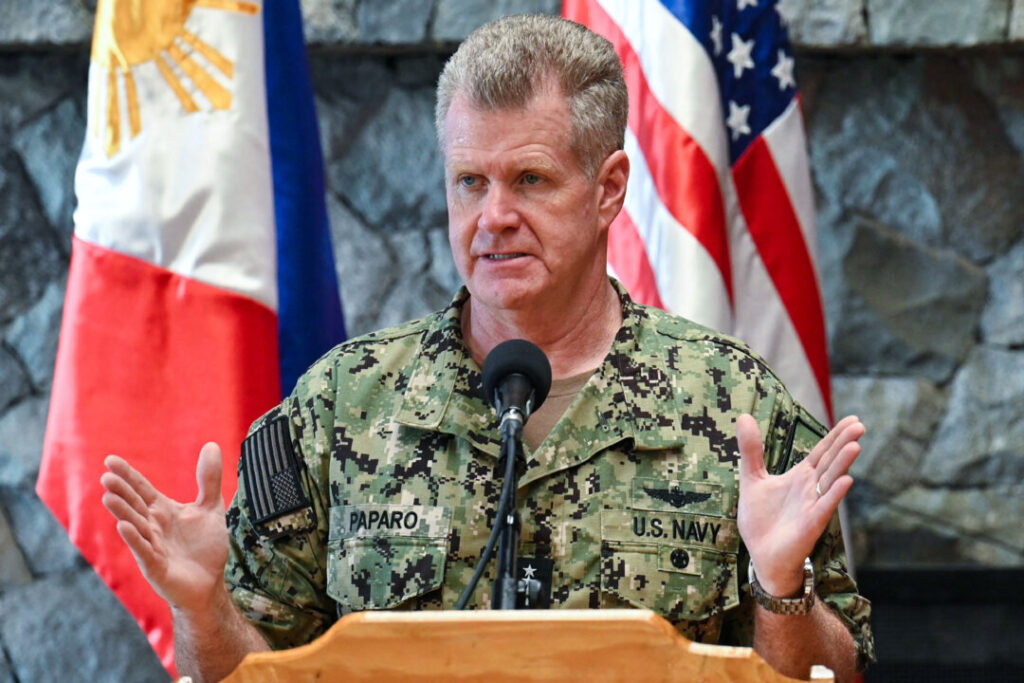“Deterrence must be backed up by the real ability to fight and win,” said Admiral Samuel Paparo, US Indo-Pacific Commander.
The United States needs a comprehensive revival in developing military capabilities to combat growing threats from communist China in the Indo-Pacific, Admiral Samuel Paparo, commander of the U.S. Indo-Pacific Command, told the Senate Armed Services Committee on April 10.
“China is increasing the US with air, missiles, maritime and space capabilities and accelerating these,” the admiral said in an opening statement. “I’m confident in my deterrent attitude, but my trajectory has to change.
“The Pacific Deterrence Initiative needs to counter China’s threats by investing in key preparations and capabilities. In fact, funding will advance the intent of this initiative and bring about improvements in key attitudes.
Committee members emphasized that US Indo-Pacific Command’s priorities worth $11 billion were not actively supplied last year, and that current capabilities require land, sea, air and space, including transport, such as more equipped submarines, personnel, amphibious ships, destroyers, aircraft carriers, aircraft, and more, particularly those like the C-130. It also called for the reopening of military bases along the Pacific Ocean, such as Adak, Alaska, and the rededication to the country’s nuclear weapons as a form of deterrence.
The Combat Logistics Force is currently 60% of what is needed, and 17 ships have been laid due to a lack of talent, and important equipment such as tankers had to be contracted. Shipbuilding, diversifying air and sea lifts, and the need to increase tanker options were also important levels.
The Admiral also emphasized that allies in the region’s role, such as Japan, South Korea and Australia, have said that the alliance offers generational advantages when they provide their own capabilities in joint exercises with the US. But he said it was good enough that the United States could do on its own to stop conflict through suggestions of power.
“Deterrence must be backed up by the real ability to fight and win,” he said. “The United States enjoys important benefits in space, counter space, command and control between the Kalman line and surface, and domination of the seabed, but that margin has been reduced, and we must regain margins and increase margins.”
When asked what his commands needed now, the Admiral described his ability to counter command, control, computing, communication, cyber, intelligence, surveillance, reconnaissance, and targeting systems.
His goal appeared to be to instill American sustainability in the region. He believed that the United States was able to win World War II.
The admirals were joined by General Xavier Branson (US Army), South Korea Allied Command, and UN Command. They emphasized the need to reinforce America’s presence in South Korea amid rumours that the current administration is focusing on China from China and preparing to remove troops from the peninsula to protect US surveillance. The United States currently has over 28,000 men and women stationed in South Korea.
The hearing is as the Communist Party of China (CCP) People’s Liberation Army continues to show attacks on Taiwan and the Philippines, and continues to engage in what is called the trade symbiosis cooperation between Russia and North Korea. He said that in exchange for sending the parts and chips needed to support Russia’s battle in Ukraine, communist China could expect to receive support from the submarine fleet. Meanwhile, North Korea’s military deployment to Russia could potentially be in exchange for modernising its air defense capabilities and perhaps support from nuclear missiles.
Committee members from both sides of the aisle appeared to use the moment to advocate the current topic of foreign policy, based on their relationship to the CCP’s dilemma.
Sen. Rick Scott (R-FLA.) asked the admiral whether the American boycott of Chinese products would affect the CCP’s ability to strengthen the CCP’s military, while democratic colleagues (DN.H.) such as Sen. Tim Kane (D-Va.) and Sen. Jeanne Shaheen questioned the fragments of military leaders’ exiters. It has been able to strengthen the confidence of the alliance of the three countries, Radio Free Asia and USAID.
Both military leaders have postponed talking about policy. Paparo described his support for the US work to spread information in China as “wherever they see the void, they fill it up to see more impact in the power of their own people.”
The Admiral stopped completely confirming that the actual weight on the military accumulation of the communist regime would realize American trade.
Another committee member asked about the importance of Taiwan, and the admiral confirmed the members’ points that the island’s position in the world economy as a provider of semiconductors could cause another great pression.
Taiwan’s absorption would also increase China’s control over the region, and the admiral did not rule out the possibility of additional conflict due to some of the US nuclear-sensitive allies in regions that have refused to submit to China due to historic tensions.



